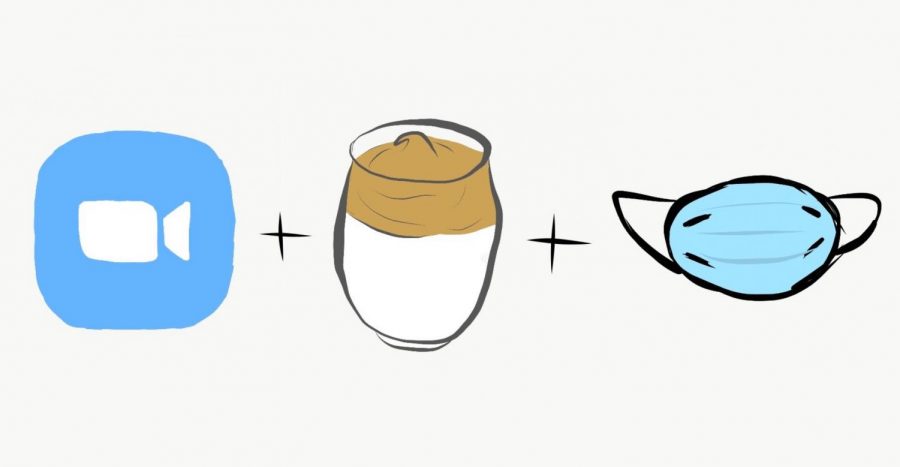The new normal: life after COVID-19 might be different than life before, and that’s okay
Photo by Lauren Patrick
May 29, 2020
It’s weird, and a bit daunting to think about, but we’re literally making history right now.
We might not all be the protagonists of the story the coronavirus is writing for us, but we’re certainly supporting characters if nothing else, and what’s going on with us as a population isn’t something that’ll be forgotten quickly by us or by historical records. The details of this pandemic are going to be displayed in the pages of a high school social studies textbook one day. The coronavirus is something that will stick around long after it’s eliminated. It will be studied and learned about and learned from by future generations, and somehow, we’re the ones actually living through it. We might be sitting in yesterday’s pajama pants and sipping whipped coffee as screens fry our corneas, but we’re leaving our frankly impressive mark on the fabric of time all the same, and you have to admit that’s kind of cool.
Because, really, this whole pandemic thing we’ve got going on is uncharted territory. We’ve faced major illnesses before, of course, and those definitely weren’t much fun either (I’ve been told that the Spanish Flu of 1918 was no picnic) but the coronavirus is just something else. COVID-19 and the worldwide reaction it’s triggered really deserves a category all it’s own, considering just how much chaos has launched from the entire ordeal and how many global changes it brought along for the ride.
Luckily, there’s an end in sight for all of this and it seems to be coming up quicker than most of us were expecting. We’ll be back to normal soon. However, with all the reactions and chaos and changes this pandemic has launched into existence, you’ve got to wonder: what’s that normal going to look like once we reach it?
In all honesty, probably not that different from the one we’re used to. The world just doesn’t change like that. Humans are creatures of habit, and although coronavirus has definitely thrown a pretty good sized wrench in everyone’s routines, people are likely to settle right back into their normal lifestyles as soon as it’s safe to do so. However, I think it’s safe to say we’ve also all learned quite a bit from this experience, and that kind of new knowledge absolutely has the capability to mix things up.
For example, how much time we spend online. For as fiercely as some old people tend to oppose the virtual revolution, we know now that it’s possible to do most things online. That doesn’t mean the transition from physical to virtual has been easy by any means, because it hasn’t been, but we can do it and now we’ve got this experience as proof. There are so many applications out there designed to keep us all connected, and using them is easier now than it ever was before. Working from home, remote learning, and all kinds of virtual communication from Zoom to texting to emails will likely see an uptick after this is done, because now we know that we can realistically pull such virtual living off and, honestly, all of this at-home stuff is kind of nice. Point for the introverts.
The habits that have been burned into our brains in order keep ourselves safe also probably aren’t going anywhere soon. Frequent hand washing and disinfecting surfaces, physical distance from those around you, hesitance with shaking hands, wearing a face mask in public… all of these things are likely to stay commonplace in the aftermath, at least for a while, and that’s not necessarily a bad thing. None of these habits are harmful, and it’s better to be safe than sorry when dealing with things like this. And if they happen to make people feel just a little bit safer too, even if the danger has mostly passed, then that’s just another plus.
Not to mention the shift in general perspective towards health care workers. The recent, amazing increase of respect and kindness towards those guys has been incredible, and for good reason considering the fact that they’re awesome. While they were commonly overlooked and taken for granted before, they’re now looked upon as the heroes they are, risking everything to keep others safe.That’s a point of view that isn’t likely to fade anytime soon and one that will almost definitely follow us into the aftermath which, again, definitely not a bad thing in any respect.
There are other things too, smaller things, that are likely to stick with us once the coronavirus is in the rear view mirror. The constant reassurance that there are enough supplies on hand to last at least the week. The spike of fear that comes when some snotty kid coughs next to you in the Walmart bread aisle. Keeping masks near, double checking the list of coronavirus symptoms when you’re feeling under the weather just to make sure you’re still okay, the sudden, crushing appreciation for a forgotten roll of toilet paper tucked into the back of the linen closet, all of that’s probably going to stick around for a while too, as unfortunate as it is. It’s only natural. History’s chronicled it and we still see the aftermath of some of those older, but no less awful, events even today, from dollar bills tucked neatly into empty toilet paper tubes by those who lived through the Great Depression, to an aversion to planes by those affected by 9/11, to the fact that we’re not allowed to have backpacks in class anymore. But we’ve learned a lot from each of these experiences all the same, and that’s what’s important.
This world is not one that changes easily, but it does shift, and each crappy thing we’ve been through as a population has left us smarter and more prepared for the next one. The coronavirus was scary for a lot of people because it proved that scary things can happen. There’s no avoiding that. But as long as we learn from it, as long as we come out stronger than we went in, we can handle it.
We’re going to be just fine, folks.



